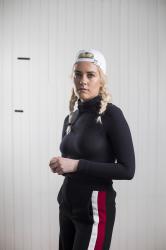If you talk about the electronic music scene in Iceland, the name Tanya Lind Pollack will probably come up in the first few minutes. While she’s best known for her collaborations with cousin and best friend Marlon Pollack, she’s also celebrated as the co-founder of the Weirdcore collective, alongside the late electronica musician Biogen. Now recording under the name Röskva, Tanya divides her time between music and her work as a seiðlistkona—that is, a shaman witch in the Norse shamanic practise. She’s Iceland’s delegate for the Circle Of Wisdom—basically the UN of shamans. We sat down with the artist and witch to talk about her inspirations.

The Icelandic Punk Scene
I was born into the core of the Icelandic punk scene. My father and uncle started Utangarðsmenn and they were basically the pioneers of bringing punk to Iceland, so I was born into the cesspool of that vibe and energy. I was basically raised surrounded by band practises and concerts. It was a very bohemian and rebellious place and my family just taught me to go my own way. Marlon and I were treated as brother and sister and we were very independent, waiting outside clubs in downtown Reykjavík to hear the drum and bass music inside. That sound was so fitting to the punk energy surrounding us and we started to try and figure out how we could make it ourselves. We were maybe 12 at this time, experimenting with equipment that our fathers set us up with.
‘Icerave’ Compilation
My parents moved us to America a short time later but Marlon stayed here, so we would create music individually and send it to each other in mixtapes. One time he stole a cassette, a compilation called ‘Icerave’, and he was so afraid of getting caught that he sent it to me. I thought it was the most mind-blowing shit I had ever heard—this intense old school hardcore. I started sampling the beats on that tape and playing keyboard over it. Fifteen years later I started hosting the Weirdcore events with Biogen who was in Ajax which was on ‘Icerave’ which is crazy to think about.
Beethoven
I studied classical piano since I was about 7 and I found classical music so passionate. You know how in other music forms you have a buildup and a chorus, a buildup and a chorus, etc. it’s not like that in classical music. It’s a journey. Beethoven influenced me a lot. Beethoven was punk. When I found out he was deaf, I could not just stop wondering how he created these amazing works of art with no hearing. I started to take note of vibrations because I never wanted anything to stop me from being able to channel music. I’d practice the piano with my eyes closed or my ears plugged up or just lean against the piano and feel the vibrations. I got really sensitive to it, so then when I started making electronic music I toned everything into vibrations that would work a certain way into my body. I developed this understanding of the importance of vibrations—vibrations that make you happy or sad or sick or heal you even.

Punk Healing
Music may not be a typical shamanic practise but it is a shamanic practise. I make healing music, music about processing feelings. Since I started I was always involved with these burgeoning cultural movements—the hip hop scene or drum and bass—so I have a punk attitude about it, or what I consider one. Being an outsider always, I never had any fear of going in a weird direction. I have this ‘fuck it’ attitude of just doing what feels right, which is what I have always been inspired by.
Buy subscriptions, t-shirts and more from our shop right here!
















